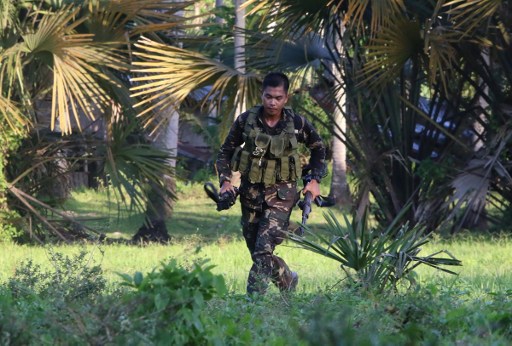AFP says it’s ‘gaining headway in defeating Abu Sayyaf’

A soldiers runs after retrieving the rifle of a colleague after clashes in the village of Napo, Inabanga town, Boloh province, in the central Philippines on April 11, 2017.
Nine people including four Philippine security officials were killed April 11 during clashes with suspected Islamic militants on a popular resort island as millions prepare to travel for the Easter holiday. AFP PHOTO
The Armed Forces of the Philippines (AFP) on Wednesday claimed victory in the clash of government forces with the terror Abu Sayyaf Group in Bohol, saying the military was “gaining important headway” in its fight against the notorious militants.
In a press briefing, AFP chief of staff Gen. Eduardo Año said government troops “successfully thwarted” the Abu Sayyaf members in the tourist island who are “now running for their lives,” as he lauded the slain soldiers and policeman and expressed condolences to their families.
“I congratulate our troops and law enforcers for a job well done. I also pass on our sincerest condolences to families of our soldiers. We mourn the loss of our member of the uniformed services including a very young officer… May this be a fine example of bayanihan in a true example of the word,” Año said.
“We are gaining important headway in our fight with the Abu Sayyaf Group… We assess that they are no longer threats to the citizens there, and we can say that the community in Inabanga, Bohol is already back to normal. Our main campaign to decimate the Abu Sayyaf will continue and it is making headway,” he said, adding that the military was expecting more Abu Sayyaf members to surrender after 11 “notorious” members conceded in Tawi-Tawi on Tuesday.
The firefight in Sitio Ilaya, in the remote village of Napo left six suspected Abu Sayyaf members dead, including top leader and sub-commander Muamar Askali alias “Abu Rami” who was also involved in the beheading of two Canadians and a German hostage in Samal Island. On the government side, three soldiers and one policeman were killed.
Article continues after this advertisementREAD: Abu Sayyaf leader Abu Rami killed in Bohol clash—AFP
Article continues after this advertisementThe AFP chief said bandits under the custody of the military positively identified Abu Rami, whom Año described as a “young, aggressive, and potential up and coming leader” of the Abu Sayyaf Group.
Año said clearing operations were still ongoing in the area to ensure the safety of residents in the community, adding that they requested the Philippine National Police-Scene of the Crime Operatives (SOCO) to conduct a clean sweep of the clash site. He said four high-powered firearms had been recovered from the scene.
More than 24 hours since the clash started, government security forces have cordoned off the village some 10 kilometers from the national highway as Special Action Force troopers from Manila arrived in the area. The last airstrike occurred at 4:40 a.m. Wednesday, authorities said.
READ: More troops sent to flush out Abu Sayyaf in Bohol
Año said the AFP on the night of April 10 received reports from local civilians on the presence of three pumpboats loaded with armed men in the remote coastal village. He said the military monitored a plan for kidnapping through its intelligence operations.
The military chief also disclosed that the bandits had local contacts from the community, which he said was now the subject of an investigation.
“Abu Sayyaf’s main business is to kidnap tourists. It’s their livelihood. If you look at past kidnappings… we monitored several plans and we shared that with our foreign counterparts. We sent alert warning memo to our troops kaya mabilis ang aksyon natin (that’s why we acted quickly),” he added.
Prior to the firefight, the United States Embassy in Manila on April 9 advised Americans in the country against travelling to Central Visayas, including the provinces of Bohol and Cebu, due to “unsubstantiated yet credible information” on kidnapping threats from terror groups. IDL
RELATED VIDEO